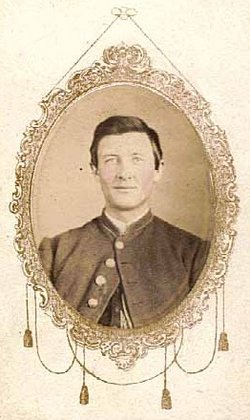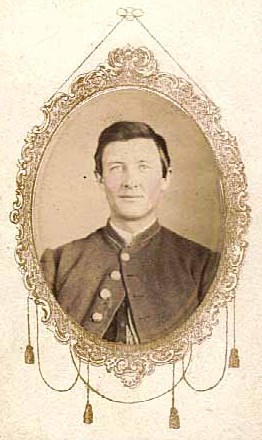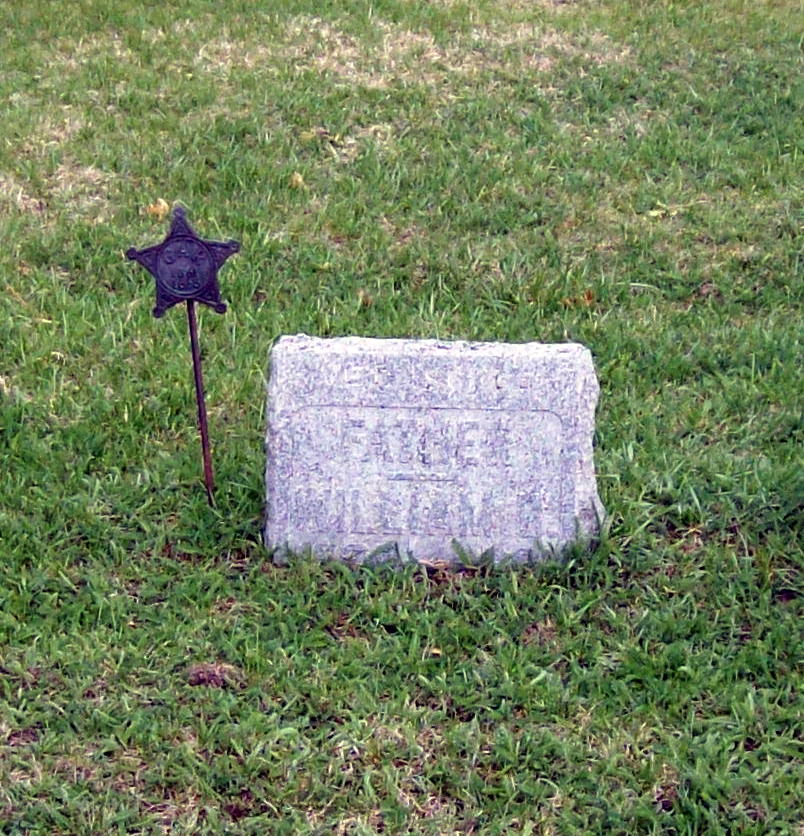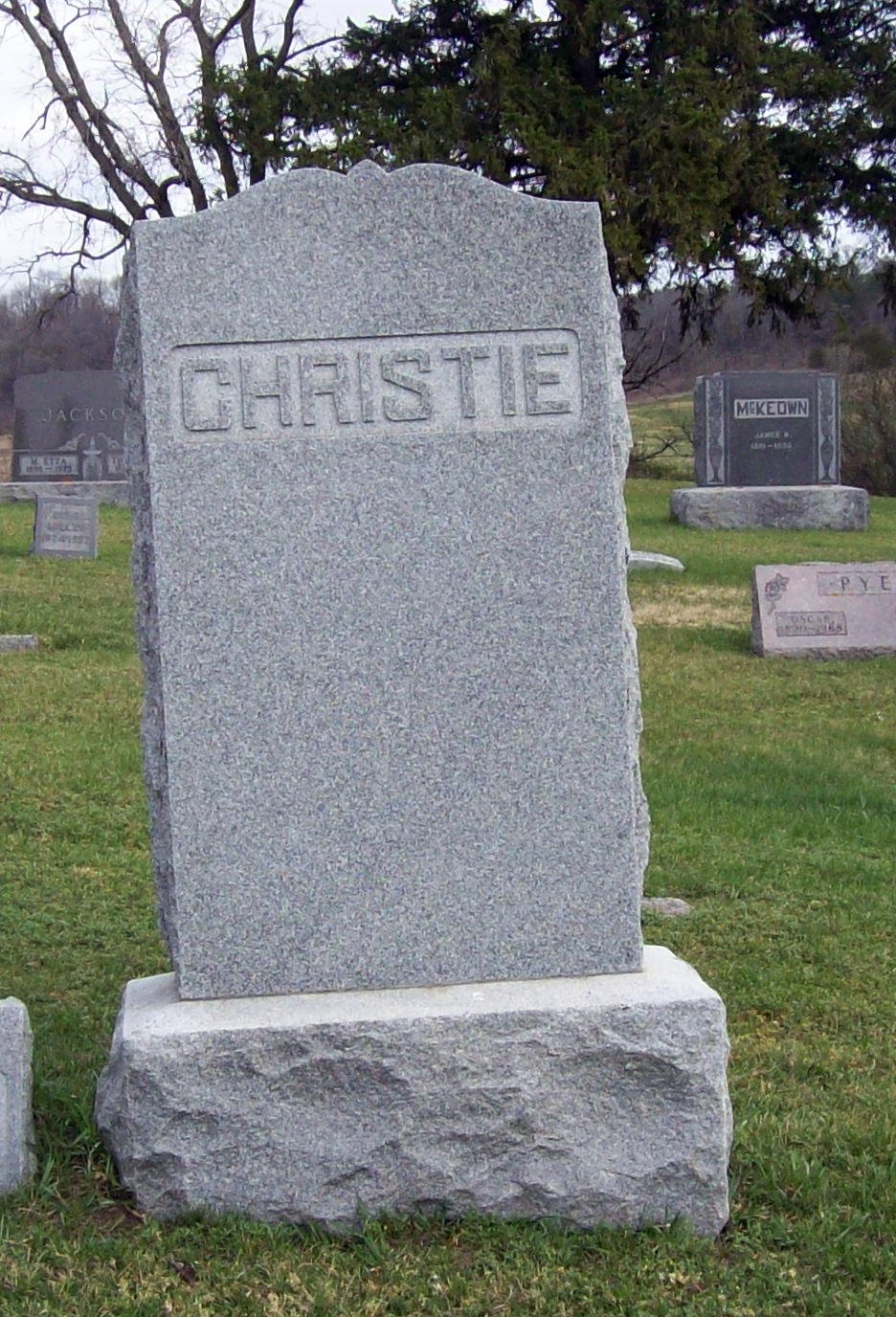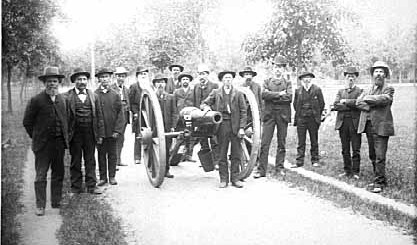Born in Dundee, Scotland, he was the son of James C. Christie and Elizabeth Gilchrist. His mother died in April 1832 after giving birth to his sister Mary, who only lived for 18 months. He was raised by his grandmother in Scotland after his father went to Ireland to work in the flax mills. He rejoined his father and stepmother Elizabeth "Eliza" Reid in Ireland in 1840. In 1846, he came with the family to the US He first settled in Wisconsin and by 1856 was farming in Olmsted County, Minnesota.
He sold his farm and enlisted with his brother Thomas in the 1st Minnesota Light Artillery on April 11, 1861. The battery organized at Fort Snelling and mustered in on Nov. 21, 1861. He was 31 years of age.
The battery was ordered to St. Louis, where they occupied Benton Barracks and then transferred to the arsenal, where they received their armament. In February, they were sent to Pittsburg Landing. Here, they saw their first action at the bloody battle of Shiloh, where they had a critical role in defending the famous "Hornets' Nest" with their guns. They next engaged in the siege and battle of Corinth, Mississippi.
While at Corinth, William began writing a series of letters to his family back home.
Written between Nov. 1, 1861 and May 13, 1864, scanned originals or transcripts of more than a dozen of these letters, can be read here:
William Christie's Letters from the Civil War.
At Vicksburg, a section of the battery was first to open fire, and as part of the Army of the Tennessee, they endured the long campaign to capture Vicksburg. They remained in camp at Vicksburg until ordered up the river in the spring of 1864 to Cairo, Illinois, then to Clifton, Tennessee, and on to Alabama.
On June 9, at Big Shanty, Georgia, they joined General Sherman's forces and fought in the battles of Atlanta and Ezra Church. Leaving two guns and soldiers who were sick in Atlanta, they participated in Sherman's famous "March to the Sea." They reached Savannah on Dec. 10, embarked for Beaufort, South Carolina on Jan. 13, 1865, and continued with the army through the Carolinas. They silenced a Confederate battery at Cheraw, S.C. so effectively that Gen. Blair presented it with one of the English Blakely guns taken from the captured battery.
After their final engagement at Benton, N.C. on March 20, 1865, William was captured and taken prisoner. However, he survived the war.
Following the war's end, the battery participated in the Grand Review of the major Union armies in Washington, D.C. They mustered out at St. Paul, Minn. on July 1, 1865. They had served and fought in many hard battles:
Fought 6 Apr 1862 at Shiloh, TN.
Fought 7 Apr 1862 at Shiloh, TN.
Fought 21 May 1862 at Pittsburg Landing, TN.
Fought 27 Apr 1863
Fought 14 Aug 1864 at Atlanta, GA.
Fought 20 Mar 1865 at Bentonville, NC.
On Dec. 30, 1865, William married his cousin, Mary Bell Aimer. In February 1866, he bought farm land near St. Charles, Minn. He and Mary had eleven children. Three sons died during the 1880 diphtheria epidemic; a daughter also died from diptheria in 1901.
William lived to be 70 years of age. His wife Mary died on Dec. 12, 1927.
William's Civil War letters were preserved by the Minnesota Historical Society. In his letters, he reveals his sense of humor, gives advice to his brothers and sisters at home, and writes of camp life, action experienced in battle, his views on slavery, his philosophy on life and the morality of war.
Following are some excerpts:
Assuredly slavery has been a greater evil to this Country than the snake the foolish blacksmith in the fable took in to his house to warm, but the smith had no compunction to kill the pesky thing when it commenced biting at him.
-Lake Providence, La., Feb. 16, 1863
...So you see, I begin my letter about myself, and end it about the same interesting subject. And I verily believe if my ears were only a few inches longer, I would make a splendid ass. Write soon; give my assinine respects to all.
-Lake Providence, La., Apr. 12, 1863
You complain of having nothing to write about. What do you suppose we poor devils have to write about? Nothing, only drumming here, and drumming there, drumming everywhere, and fifing for the same. Dixie played on one side of you, Yankee Doodle behind you. The Prairie Flower in front, and Girl I Left Behind Me on the other side; accompanied By the Devil's Dream by another band close by...
-Vicksburg, Mississippi, July 16, 1863
-Biography by Cindy K. Coffin
Sources:
Minnesota in the Civil and Indian Wars 1861-65
Minnesota Adjutant General's Report of 1866
Minnesota Historical Society Collection, James C. Christie and family papers. Civil War letters of the Christie family
Born in Dundee, Scotland, he was the son of James C. Christie and Elizabeth Gilchrist. His mother died in April 1832 after giving birth to his sister Mary, who only lived for 18 months. He was raised by his grandmother in Scotland after his father went to Ireland to work in the flax mills. He rejoined his father and stepmother Elizabeth "Eliza" Reid in Ireland in 1840. In 1846, he came with the family to the US He first settled in Wisconsin and by 1856 was farming in Olmsted County, Minnesota.
He sold his farm and enlisted with his brother Thomas in the 1st Minnesota Light Artillery on April 11, 1861. The battery organized at Fort Snelling and mustered in on Nov. 21, 1861. He was 31 years of age.
The battery was ordered to St. Louis, where they occupied Benton Barracks and then transferred to the arsenal, where they received their armament. In February, they were sent to Pittsburg Landing. Here, they saw their first action at the bloody battle of Shiloh, where they had a critical role in defending the famous "Hornets' Nest" with their guns. They next engaged in the siege and battle of Corinth, Mississippi.
While at Corinth, William began writing a series of letters to his family back home.
Written between Nov. 1, 1861 and May 13, 1864, scanned originals or transcripts of more than a dozen of these letters, can be read here:
William Christie's Letters from the Civil War.
At Vicksburg, a section of the battery was first to open fire, and as part of the Army of the Tennessee, they endured the long campaign to capture Vicksburg. They remained in camp at Vicksburg until ordered up the river in the spring of 1864 to Cairo, Illinois, then to Clifton, Tennessee, and on to Alabama.
On June 9, at Big Shanty, Georgia, they joined General Sherman's forces and fought in the battles of Atlanta and Ezra Church. Leaving two guns and soldiers who were sick in Atlanta, they participated in Sherman's famous "March to the Sea." They reached Savannah on Dec. 10, embarked for Beaufort, South Carolina on Jan. 13, 1865, and continued with the army through the Carolinas. They silenced a Confederate battery at Cheraw, S.C. so effectively that Gen. Blair presented it with one of the English Blakely guns taken from the captured battery.
After their final engagement at Benton, N.C. on March 20, 1865, William was captured and taken prisoner. However, he survived the war.
Following the war's end, the battery participated in the Grand Review of the major Union armies in Washington, D.C. They mustered out at St. Paul, Minn. on July 1, 1865. They had served and fought in many hard battles:
Fought 6 Apr 1862 at Shiloh, TN.
Fought 7 Apr 1862 at Shiloh, TN.
Fought 21 May 1862 at Pittsburg Landing, TN.
Fought 27 Apr 1863
Fought 14 Aug 1864 at Atlanta, GA.
Fought 20 Mar 1865 at Bentonville, NC.
On Dec. 30, 1865, William married his cousin, Mary Bell Aimer. In February 1866, he bought farm land near St. Charles, Minn. He and Mary had eleven children. Three sons died during the 1880 diphtheria epidemic; a daughter also died from diptheria in 1901.
William lived to be 70 years of age. His wife Mary died on Dec. 12, 1927.
William's Civil War letters were preserved by the Minnesota Historical Society. In his letters, he reveals his sense of humor, gives advice to his brothers and sisters at home, and writes of camp life, action experienced in battle, his views on slavery, his philosophy on life and the morality of war.
Following are some excerpts:
Assuredly slavery has been a greater evil to this Country than the snake the foolish blacksmith in the fable took in to his house to warm, but the smith had no compunction to kill the pesky thing when it commenced biting at him.
-Lake Providence, La., Feb. 16, 1863
...So you see, I begin my letter about myself, and end it about the same interesting subject. And I verily believe if my ears were only a few inches longer, I would make a splendid ass. Write soon; give my assinine respects to all.
-Lake Providence, La., Apr. 12, 1863
You complain of having nothing to write about. What do you suppose we poor devils have to write about? Nothing, only drumming here, and drumming there, drumming everywhere, and fifing for the same. Dixie played on one side of you, Yankee Doodle behind you. The Prairie Flower in front, and Girl I Left Behind Me on the other side; accompanied By the Devil's Dream by another band close by...
-Vicksburg, Mississippi, July 16, 1863
-Biography by Cindy K. Coffin
Sources:
Minnesota in the Civil and Indian Wars 1861-65
Minnesota Adjutant General's Report of 1866
Minnesota Historical Society Collection, James C. Christie and family papers. Civil War letters of the Christie family
Family Members
Sponsored by Ancestry
Advertisement
Advertisement
